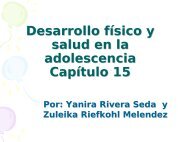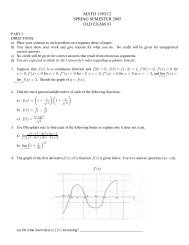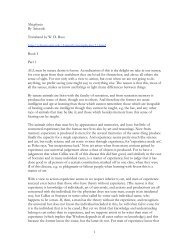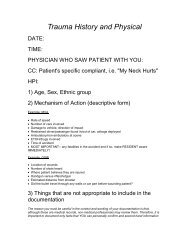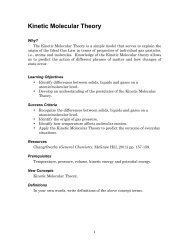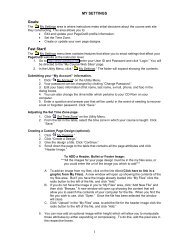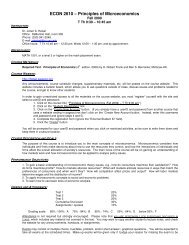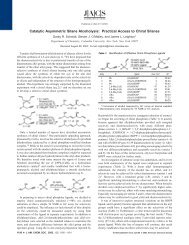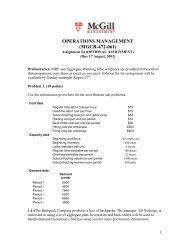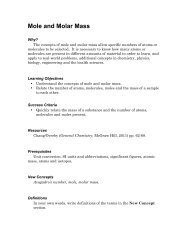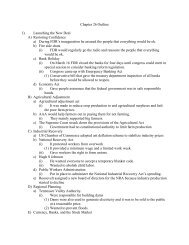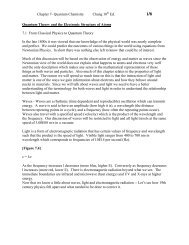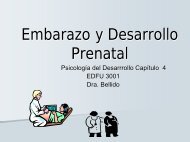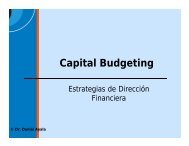The CARS Checklist - PageOut
The CARS Checklist - PageOut
The CARS Checklist - PageOut
Create successful ePaper yourself
Turn your PDF publications into a flip-book with our unique Google optimized e-Paper software.
McGraw-Hill/Dushkin: Dushkin Online: Conducting Web-based Research<br />
http://www.dushkin.com/online/webresearch/cars.mhtml<br />
<strong>The</strong> <strong>CARS</strong> <strong>Checklist</strong><br />
<strong>The</strong> <strong>CARS</strong> <strong>Checklist</strong> (Credibility, Accuracy, Reasonableness, Support) is<br />
designed for ease of use. Few sources will meet every criterion in the list, and<br />
even those that do may not possess the highest level of quality possible. But if you<br />
learn to use the criteria in this list, you will be much better able to separate the<br />
high-quality information from the poor-quality information.<br />
Read each section below or jump right to the summary. When you're done try this<br />
activity which will help you begin to use the <strong>CARS</strong> checklist.<br />
Credibility Accuracy Reasonableness Support<br />
Credibility<br />
Because people have always made important decisions based on information,<br />
evidence of authenticity and reliability or credibility, believability has always been<br />
important. If you read an article saying that the area where you live will experience<br />
a major earthquake in the next six months, it is important that you should know<br />
whether or not to believe the information. Some questions to ask about general<br />
credibility might include these:<br />
Is there sufficient evidence presented to make the argument persuasive?<br />
Are there compelling arguments and reasons given?<br />
Are there enough details for a reasonable conclusion about the information?<br />
<strong>The</strong>re are several tests you can apply to a source to help you judge how credible<br />
and useful it will be:<br />
Author?s Credentials. <strong>The</strong> author or source of the information should show some<br />
evidence of being knowledgeable, reliable, and truthful.<br />
1 of 13 5/31/09 1:11 PM
McGraw-Hill/Dushkin: Dushkin Online: Conducting Web-based Research<br />
http://www.dushkin.com/online/webresearch/cars.mhtml<br />
Some questions you might ask would include the following:<br />
What about this source makes it believable (or not)?<br />
How does this source know this information?<br />
Why should I believe this source over another?<br />
As you can see, the key to credibility is the question of trust. Here are some clues<br />
to credibility:<br />
Author?s education, training, and/or experience in a field relevant to the<br />
information. Look for biographical information, the author?s title, or<br />
position of employment<br />
Author?s contact information (e-mail or postal mail address, telephone<br />
number)<br />
Organizational authorship from a known and respected organization<br />
(corporate, governmental, or non-profit)<br />
Organizational authorship reflecting an appropriate area of expertise<br />
Author?s reputation or standing among peers.<br />
Evidence of Quality Control<br />
Most scholarly journal articles pass through a peer review process, whereby<br />
several readers must examine and approve content before it is published.<br />
Statements issued in the name of an organization have almost always been seen<br />
and approved by several people. (But note the difference between, ?Allan<br />
Thornton, employee of the National Oceanographic and Atmospheric Agency,<br />
says that a new ice age is near,? and ?<strong>The</strong> National Oceanographic and<br />
Atmospheric Agency said today that a new ice age is near.? <strong>The</strong> employee is<br />
speaking for himself, where-as a statement in the name of NOAA repre-sents the<br />
official position of NOAA.)<br />
Evaluation Tip<br />
Feel free to contact the author of a source by e-mail or telephone when such<br />
contact information is given. Many authors are willing to clarify points or explain<br />
details further. Communicating with the author will also give you more evidence<br />
about credibility.<br />
Evidence of quality control of Web material includes these items:<br />
Information presented on corporate, government, or organizational Web<br />
2 of 13 5/31/09 1:11 PM
McGraw-Hill/Dushkin: Dushkin Online: Conducting Web-based Research<br />
http://www.dushkin.com/online/webresearch/cars.mhtml<br />
sites<br />
Online journals that use refereeing (peer review) by editors or others<br />
Postings of information taken from books or journals that have a quality<br />
control process Indicators of Lack of Credibility. You can sometimes tell by<br />
the tone, style, or com-petence of the writing whether or not the information<br />
is suspect.<br />
Here are a few clues to lack of credibility:<br />
Anonymity<br />
No indication of a third party editor or publisher to ensure the quality and<br />
reliability of the information<br />
Negative metainformation. If all the reviews are critical, be careful. (See the<br />
discussion about metainformation later in this chapter.)<br />
Bad grammar or misspelled words. Most educated people use grammar<br />
fairly well and check their work for spelling errors. An occasional split<br />
infinitive or comma in the wrong place is not unusual, but more than two or<br />
three spelling or grammar errors is cause for caution, at least. Whether the<br />
errors come from carelessness or ignorance, neither puts the information or<br />
the writer in a favorable light.<br />
Evaluation Tip<br />
<strong>The</strong> top-level domain .gov is used by state and federal government agencies and<br />
indicates that the information has the sanction of that government agency.<br />
Information from these domains is usually highly reliable. For example, you can<br />
obtain reliable census information from the Census Bureau at www.census.gov or<br />
information about medicine, food, or cosmetics from the Food and Drug<br />
Administration at www.fda.gov<br />
Back To Top<br />
Accuracy<br />
<strong>The</strong> goal of the accuracy test is to ensure that the information is actually correct:<br />
up-to-date, factual, detailed, exact, and comprehensive. For example, even though<br />
a very credible writer said something that was correct twenty years ago, it may not<br />
be correct today. Similarly, a reputable source might be giving up-to-date<br />
information, but the information may be only partial and not give the full story.<br />
Here are some concepts related to accuracy:<br />
Timeliness<br />
3 of 13 5/31/09 1:11 PM
McGraw-Hill/Dushkin: Dushkin Online: Conducting Web-based Research<br />
http://www.dushkin.com/online/webresearch/cars.mhtml<br />
Some work is timeless, like the classic novels and stories, or like the<br />
thought-provoking philosophical work of Aristotle and Plato. Other work has a<br />
limited useful life because of advances in the discipline (psychological theory, for<br />
example), and some work is outdated very quickly (like technology news). You<br />
must therefore be careful to note when the information you find was created, and<br />
then decide whether it is still of value (and how much value). You may need<br />
information within the past ten years, five years, or even two weeks. But old is not<br />
necessarily bad: nineteenth-century American history books or literary anthologies<br />
can be highly educational because they can function as comparisons with what is<br />
being written or anthologized now. In many cases, though, you want accurate,<br />
up-to-date information.<br />
An important idea connected with timeliness is the dynamic, fluid nature of<br />
informa-tion and the fact that constant change means constant changes in<br />
timeliness. <strong>The</strong> facts we learn today may be timely now, but tomorrow will not be.<br />
Especially in technology, science, medicine, business, and other fields always in<br />
flux, we must remember to check and re-check our data from time to time, and<br />
realize that we will always need to update our facts. Comprehensiveness. Any<br />
source that presents conclusions or that claims (explicitly or implicitly) to give a<br />
full and rounded story, should reflect the intentions of completeness and accuracy.<br />
In other words, the information should be comprehensive. Some writers argue that<br />
researchers should be sure that they have ?complete? information before making a<br />
decision or coming to a conclusion. But with the advent of the information age,<br />
such a goal is impossible, if by ?complete? we mean all possible information. No<br />
one can read 20,000 articles on the same subject before coming to a conclusion or<br />
making a decision. On the other hand, an information source that deliberately<br />
leaves out important facts, qualifications, consequences, or alternatives may be<br />
misleading or even intentional-ly deceptive. And since no single piece of<br />
information will offer the truly complete story, even if accuracy and fairness are<br />
intended, we must rely on more than one source to provide us with a fuller view of<br />
the situation.<br />
Evaluation Tip<br />
You can use your browser to find out when a Web page was last modified, even<br />
though there may not be a visible date on the page itself. In Netscape, use ?View,?<br />
?Page Info? and you will see a ?Last Modified? field with a date. In Internet<br />
Explorer, using ?File,? ?Properties? you will get the date the information was<br />
transferred to your disc, not the date the page was modified.<br />
Audience and Purpose<br />
4 of 13 5/31/09 1:11 PM
McGraw-Hill/Dushkin: Dushkin Online: Conducting Web-based Research<br />
http://www.dushkin.com/online/webresearch/cars.mhtml<br />
For whom is this source intended and for what purpose? If, for example, you find<br />
an article, ?How Plants Grow,? and children are the intended audience, then the<br />
material may be too simplified for your college botany paper. More impor-tant to<br />
the evaluation of information is the purpose for which the information was created.<br />
For example, an article titled, ?Should You Buy or Lease a Car?? might have been<br />
written with the purpose of being an objective analysis, but it may instead have<br />
been written with the intention of persuading you that leasing a car is better than<br />
buying. In such a case, the information will most likely be highly biased or<br />
distorted. Such information is not useless, but the bias must be taken into<br />
consideration when interpreting and using the informa-tion. (In some cases, you<br />
may be able to find the truth by using only biased sources, some biased in one<br />
direction and some biased in the other.) Be sure, then, that the intended audience<br />
and purpose of the article are appropriate to your requirements or at least clearly in<br />
evi-dence so that you may take them into account. Information pretending to<br />
objectivity but possessing a hidden agenda of persuasion or a hidden bias is quite<br />
common in our culture.<br />
Indicators of a Lack of Accuracy<br />
In addition to an obvious tone or style that reveals a carelessness with detail or<br />
accuracy, there are several indicators that may mean the source is inaccurate, either<br />
in whole or in part:<br />
No date on the document<br />
Assertions that are vague or otherwise lacking detail<br />
Sweeping rather than qualified language (that is, the use of always, never,<br />
every, completely rather than usually, seldom, some-times, tends, and so<br />
forth)<br />
An old date on information known to change rapidly<br />
Very one-sided view that does not acknowledge opposing views or respond<br />
to them<br />
Back To Top<br />
Reasonableness<br />
<strong>The</strong> test of reasonableness involves examining the information for fairness,<br />
objectivity, moderateness, and consistency. Fairness. Fairness includes offering a<br />
balanced, reasoned argument. ment, not selected or slanted. Even ideas or claims<br />
made by the source?s opponents should be presented in an accurate manner.<br />
Pretending that the opponent has wild, irra-tional ideas or arguments no one could<br />
5 of 13 5/31/09 1:11 PM
McGraw-Hill/Dushkin: Dushkin Online: Conducting Web-based Research<br />
http://www.dushkin.com/online/webresearch/cars.mhtml<br />
accept is to commit the straw man fallacy. A good information source will also<br />
possess a calm, reasoned tone, arguing or presenting material thoughtfully and<br />
without attempting to get you emotionally worked up. Pay attention to the tone and<br />
be cautious of highly emotional writing. Angry, hateful, critical, spiteful tones<br />
often betray an irrational and unfair attack under way rather than a reasoned<br />
argument. And writing that attempts to inflame your feelings to prevent you from<br />
thinking clearly is also unfair and manipulative.<br />
Objectivity<br />
<strong>The</strong>re is no such thing as pure objectivity, but a good writer should be able to<br />
control his or her biases. Be aware that some organizations are naturally not<br />
neutral. For example, a professional antibusiness group will find, say, that some<br />
company or industry is overcharging for widgets. <strong>The</strong> industry trade association,<br />
on the other hand, can be expected to find that no such over-charging is taking<br />
place. Be on the lookout for slanted, biased, politically distorted work. One of the<br />
biggest hindrances to objectivity is conflict of interest. Sometimes an infor-mation<br />
source will benefit in some way (usually financially, but sometimes politically or<br />
even emotionally or psychologically) if that source can get you to accept certain<br />
informa-tion rather than the pure and objective truth. For example, many sites that<br />
sell ?natural? products (cosmetics, vitamins, clothes, food) often criticize their<br />
competitors for selling bad, unhealthy, or dangerous products. <strong>The</strong> criticism may<br />
be just, but because the messenger will gain financially if you believe the message,<br />
you should be very careful?and check somewhere else before spending money or<br />
believing the tale.<br />
Moderateness<br />
Moderateness is a test of the information against how the world really is. Use your<br />
knowledge and experience to ask if the information is really likely, possible, or<br />
probable. Most truths are ordinary. If a claim being made is surprising or hard to<br />
believe, use caution and demand more evidence than you might require for a lesser<br />
claim. Claims that seem to run against established natural laws also require more<br />
evidence. In other words, do a reality check. Is the information believable? Does it<br />
make sense? Or do the claims lack face validity? That is, do they seem to conflict<br />
with what you already know in your experience, or do they seem too exaggerated<br />
to be true? For example, does the statement, ?Half of all Americans have had their<br />
cars stolen,? pass the face validity test? Have half of your friends had their cars<br />
stolen? Is the subject on the news regularly (as we might assume it would be if<br />
such a level of theft were the case)?<br />
It is important, of course, to remember that some truths are spectacular and<br />
6 of 13 5/31/09 1:11 PM
McGraw-Hill/Dushkin: Dushkin Online: Conducting Web-based Research<br />
http://www.dushkin.com/online/webresearch/cars.mhtml<br />
immoderate. If you have read about, say, the Tulipmania in Holland in 1636?1637,<br />
where some single tulip bulbs sold for the equivalent of tens of thousands of<br />
dollars each, the idea of immoderate truth will not be so strange to you. Do not,<br />
therefore, automatically reject a claim or source simply because it is astonishing.<br />
Just be extra careful about checking it out.<br />
Evaluation Tip<br />
Many Web sites are sponsored by news organizations that have printed or<br />
broadcast counterparts. As a general rule, if the print-ed or broadcast source is<br />
reliable, so too is the online counterpart. <strong>The</strong> online sites for Time, CNN, <strong>The</strong><br />
New York Times, ABC News, and so forth, have the same reputation to uphold<br />
and the same resources to devote to fact checking and accuracy as their traditional<br />
media ver-sions, and should therefore be just as professional. <strong>The</strong>re have been a<br />
few notable exceptions, but those have indeed been exceptions. (Similarly, the<br />
online versions of the incredible sources, such as some of the tabloids, should be<br />
viewed with the same suspicion used for the printed version.)<br />
Consistency<br />
<strong>The</strong> consistency test simply requires that the argument or information does not<br />
contradict itself. Sometimes when people spin falsehoods or distort the truth,<br />
inconsistencies or even contradictions show up. <strong>The</strong>se are evidence of<br />
unreasonableness. Perhaps an obvious example comes from some of the chain<br />
letters that circulate on the Internet and by fax machine: they affirm that they have<br />
come to you ?to bring you cheer and good luck,? only to threaten you (not very<br />
indirectly) with unemployment or death if you do not continue to circulate the<br />
letter.<br />
World View<br />
A writer?s view of the world (political, economic, religious?including<br />
antireligious?and philosophical) often influences his or her writing profoundly,<br />
from the subjects chosen to the slant, the issues raised, issues ignored, fairness to<br />
opponents, kinds of examples, and so forth. Some writers? value systems permit<br />
them to fabricate evidence, lie, or falsify the positions of others for the sake of<br />
what they think is a noble cause?or perhaps political expediency. For these writers,<br />
political agendas take precedence over truth. Knowing about such distorting world<br />
views can therefore provide another evaluative test for reasonableness.<br />
Indicators of a Lack of Reasonableness<br />
7 of 13 5/31/09 1:11 PM
McGraw-Hill/Dushkin: Dushkin Online: Conducting Web-based Research<br />
http://www.dushkin.com/online/webresearch/cars.mhtml<br />
Writers who put themselves in the way of the argument, either emotionally or<br />
because of self-interest, often reveal their lack of reasonableness. If, for example,<br />
you find a writer reviewing a book he opposes by asserting that ?the entire book is<br />
completely worthless claptrap,? you might suspect there is more than a reasoned<br />
disagreement at work.<br />
Here are some clues to a lack of reasonableness:<br />
Intemperate tone or language (?stupid jerks,? ?shrill cries of my extremist<br />
opponents?)<br />
Overclaims (?Thousands of children are murdered every day in the United<br />
States.?)<br />
Sweeping statements of excessive significance (?This is the most important<br />
idea ever conceived!?)<br />
Conflict of interest (?Welcome to the Old Stogie Tobacco Company Home<br />
Page. To read our report, ?Cigarettes Make You Live Longer,? click here.?<br />
or ?When you buy a stereo, beware of other brands that lack our patented<br />
circuitry.?)<br />
Back To Top<br />
Support<br />
<strong>The</strong> area of support is concerned with the source and corroboration of the<br />
information. Much information, especially statistics and claims of fact, comes from<br />
other sources. Citing sources strengthens the credibility of the information.<br />
(Remember this when you write a research paper.)<br />
Source Documentation or Bibliography. When facts or statis-tics are quoted, look<br />
to see whether their source is revealed, so that you could check their accuracy.<br />
Some source considerations include these:<br />
Where did this information come from?<br />
What sources did the information creator use?<br />
Are the sources listed?<br />
Is there a bibliography or other documentation?<br />
Does the author provide contact information in case you wish to discuss an<br />
issue or request further clarification?<br />
What kind of support for the information is given?<br />
How does the writer know this?<br />
8 of 13 5/31/09 1:11 PM
McGraw-Hill/Dushkin: Dushkin Online: Conducting Web-based Research<br />
http://www.dushkin.com/online/webresearch/cars.mhtml<br />
It is especially important for statistics to be documented. Otherwise, someone may<br />
be just making up numbers. Note that some information from corporate sites<br />
consists of descriptions of products, techniques, technologies, or processes with<br />
which the corporation is involved. If you are careful to distinguish between facts<br />
(?We mix X and Y together to get Z?) and advertising (?This protocol is the best<br />
in the industry?), then such descriptions should be reliable.<br />
Corroboration<br />
See if other sources support this source. Corroboration or confirmability is an<br />
important test of truth. And even in areas of judgment or opinion, if an argument is<br />
sound, there will probably be a number of people who adhere to it or who are in<br />
some general agreement with parts of it. Whether you?re looking for a fact (like<br />
the lyrics to a song or the date of an event), an opinion (such as whether paper or<br />
plastic is the more environmentally friend-ly choice), or some advice (such as how<br />
to grow bromeliads), it is a good idea to triangulate your findings: that is, find at<br />
least three sources that agree. If the sources do not agree, do further research to<br />
find out the range of opinion or disagreement before you draw your conclusions.<br />
What you are doing with corroboration, then, is using information to test<br />
information. Use one source, fact, point of view, or inter-pretation to test another.<br />
Find other informa-tion to support and reconfirm (or to challenge or rebut)<br />
information you have found. It is critical, of course, to consider the quality of the<br />
corroborative information. <strong>The</strong>re is at least one situation on the Web now where<br />
more than a dozen ?natural care? sites have all repeated the same false story that<br />
the surfactant sodium laureth sulfate (used in many cosmetics) causes cancer. (<strong>The</strong><br />
owners of these sites sell products that do not contain this ingredient.) Finding the<br />
same claim on several of these sites is certainly not corroboration. For a<br />
corroborative test, you should look to disinterested third parties, in this case to the<br />
federal government, toxicology reports, and the like.<br />
Corroboration is especially important when you find dramatic or surprising<br />
information (information failing the moderateness test, above). For example, a<br />
claim like the one just mentioned, that some commonly used substance is harmful,<br />
should be viewed with skepticism until it can be confirmed (or rebutted) by further<br />
research and by truly reliable sources. <strong>The</strong> claim may be true, but it seems unlikely<br />
that both government and consumer organizations would let a harmful chemical or<br />
other product go unchallenged.<br />
Evaluation Tip<br />
9 of 13 5/31/09 1:11 PM
McGraw-Hill/Dushkin: Dushkin Online: Conducting Web-based Research<br />
http://www.dushkin.com/online/webresearch/cars.mhtml<br />
A quirk of human nature causes most of us to value what is scarce. Some<br />
information producers who want to manipulate us therefore pretend to have<br />
?secret? or ?exclusive? information?which, of course, cannot therefore be<br />
corroborated. Be very careful of such informa-tion. Remember that, when it comes<br />
to informa-tion, ?secret? is nearly a synonym for ?gossip,? and ?exclusive? means<br />
roughly ?unsubstantiated? or ?unconfirmed.?<br />
External Consistency<br />
While the test of corroboration involves finding out whether other sources contain<br />
the same new informa-tion as the source being evaluated, the test of external<br />
consistency compares what is familiar in the new source with what is familiar in<br />
other sources. That is, information is usually a mixture of old and new, of some<br />
things you already know and some things you do not. <strong>The</strong> test of external<br />
consistency asks, Where this source discusses facts or ideas I already know<br />
something about, does the source agree or harmonize or does it conflict,<br />
exaggerate, or distort? <strong>The</strong> reasoning is that if a source is faulty where it discusses<br />
something you already know, it is likely to be faulty in areas where you do not yet<br />
know, and you should therefore be cautious and skeptical about trusting it.<br />
Indicators of a Lack of Support<br />
As you can readily guess, the lack of supporting evi-dence provides the best<br />
indication that there is indeed no available support.<br />
Be careful then, when a source shows problems like these:<br />
Numbers or statistics presented with-out an identified source for them<br />
Absence of source documentation when the discussion clearly needs such<br />
documentation<br />
Lack of any other sources that pre-sent the same information or acknowledge<br />
that the same informa-tion exists (lack of corroboration) Evaluation Tip<br />
As you continue to work in the world of information, you should begin to<br />
devel-op an effective ?baloney detector,? which will enable you to sense when a<br />
claim is too good, too bad, too excessive, or too weird to be true. Suppose, for<br />
example, you receive a chain letter e-mail claiming that you will be paid five<br />
thousand dollars if you for-ward it to all your friends. How likely is that to be<br />
true? And if it were true, wouldn?t you expect to hear about such an amaz-ing deal<br />
on the nightly news or in the paper? You can keep your baloney detector tuned up<br />
by read-ing widely and getting a good sense of what generally happens, and what<br />
10 of 13 5/31/09 1:11 PM
McGraw-Hill/Dushkin: Dushkin Online: Conducting Web-based Research<br />
http://www.dushkin.com/online/webresearch/cars.mhtml<br />
truths and myths are spreading around the Web or another part of the information<br />
environment.<br />
Back To Top<br />
Summary of the <strong>CARS</strong> <strong>Checklist</strong> for Research<br />
Source Evaluation<br />
Credibility<br />
Trustworthy source, the quality of evidence and argument, author?s credentials,<br />
evidence of quality control, known or respected authority, organizational support.<br />
Goal: an authoritative source; a source that supplies some good evidence that<br />
allows you to trust it.<br />
Accuracy<br />
Up-to-date, factual, detailed, exact, comprehensive, audience and purpose reflect<br />
intentions of completeness and accuracy. Goal: a source that is correct today (not<br />
yesterday); a source that gives the whole truth.<br />
Reasonableness<br />
Fair, balanced, objective, reasoned, no conflict of interest, absence of fallacies or<br />
slanted tone. Goal: a source that engages the subject thoughtfully and reasonably; a<br />
source concerned with the truth.<br />
Support<br />
Listed sources, contact information, available corroboration, claims supported,<br />
documentation supplied. Goal: a source that provides convincing evidence for the<br />
claims made; a source you can triangu-late (find at least two other sources that<br />
support it).<br />
Back To Top<br />
Back to top of page<br />
11 of 13 5/31/09 1:11 PM
McGraw-Hill/Dushkin: Dushkin Online: Conducting Web-based Research<br />
http://www.dushkin.com/online/webresearch/cars.mhtml<br />
Home<br />
Book<br />
Support<br />
Study<br />
Tips<br />
Search<br />
Strategies<br />
Research<br />
Links<br />
Your<br />
Future<br />
Cool<br />
Links<br />
12 of 13 5/31/09 1:11 PM
McGraw-Hill/Dushkin: Dushkin Online: Conducting Web-based Research<br />
http://www.dushkin.com/online/webresearch/cars.mhtml<br />
13 of 13 5/31/09 1:11 PM



